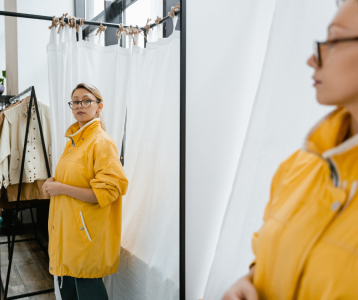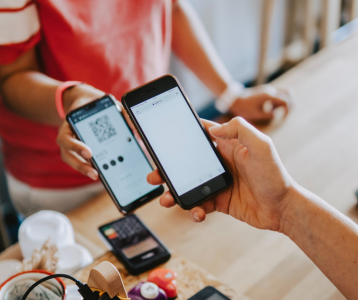Discover the true secret behind store mirrors at self-checkouts—it may not be what you think!
As stealing becomes more ‘popular’ in our current economic climate, shops are doing a multitude of things to stop it, such as keeping items behind glass and using security cameras.
Yet, there's a simple technique that was used before CCTV to reduce theft—placing a mirror at the self-checkout stations.
If you see yourself when you're checking out your items, it's not just for you to see how you look. The mirror is there to make those who might want to steal think twice about it.
Several studies show that when people see their reflection in a mirror, they usually don't do bad things.
‘People behave in accordance with social desirability in the presence of mirrors,’ one study from 1976 found.
‘Mirrors influence impulsivity, a feature that is closely related to decision-making in both social and non-social situations.’
The study also noted that ‘participants’ private self-awareness was activated by the mirrors, which influenced their ‘decision-making as a non-social cue’ throughout the test.
The results even showed that when people see themselves, they often act better and follow rules.
Another research from the University of East Anglia discovered that asking drivers to think about their actions on a warning sign could get more people to follow the advice.
They conducted an experiment using a road sign that encouraged drivers to turn off their engines at a railroad crossing while waiting for a train.
The sign initially said, ‘When barriers are down, switch off your engine,’ and 30% of drivers complied. However, when the phrase, ‘Think of yourself,’ was added to the sign, compliance increased to 51%.
A report by Mashed last year suggested placing mirrors at self-checkout counters is a strategy to deter theft by making individuals ‘more aware of their own behaviour’.
The topic of mirrors at self-checkout stations has been a subject of extensive discussion on Reddit over the years, with many concurring with a specific theory.

One user shared: ‘A study in social psychology suggested that people tip more and are less likely to steal when a large set of eyes, such as a painting, are placed near the patron.’
‘It is thought to increase self-consciousness. Mirrors are also effective at raising the awareness of the self.’
‘Perhaps shoppers at supermarkets will be less prone to theft when presented with their very image following their every move.’
Another wrote, ‘The reason they put mirrors up at supermarkets and other stores is actually quite interesting, it is derived from psychology.’
‘They think people will question their own self-concept in relation to morals and think twice about stealing.'
‘It reduces theft. Or at least it is supposed to,’ someone agreed. ‘That is why there are so many mirrors in hotel rooms. Reduces damages.’
Earlier this year, retail theft in Australia hit an all-time high. In response, stores have adopted various security measures, including the use of AI technology and placing mirrors in places at self-checkouts to deter theft.
Coles takes a bold stand against theft
Coles has recently implemented ‘smart gateway technology’ to make sure shoppers pay for their items before leaving the store.
This system uses automated panels to allow paying customers to exit while deterring theft by remaining closed for others.
They will also introduce a ‘trolley lock’ system to prevent unpaid groceries from leaving the store.
Moreover, Coles plans to equip 30 high-risk stores in multiple states with body-worn cameras to improve security and real-time monitoring of staff and customer interactions.
For the full story, please read more here.

Members, what are your thoughts on this story? Could the presence of mirrors at self-checkout stations really deter theft and influence behaviour positively? Join the discussion in the comments below!
Yet, there's a simple technique that was used before CCTV to reduce theft—placing a mirror at the self-checkout stations.
If you see yourself when you're checking out your items, it's not just for you to see how you look. The mirror is there to make those who might want to steal think twice about it.
Several studies show that when people see their reflection in a mirror, they usually don't do bad things.
‘People behave in accordance with social desirability in the presence of mirrors,’ one study from 1976 found.
‘Mirrors influence impulsivity, a feature that is closely related to decision-making in both social and non-social situations.’
The study also noted that ‘participants’ private self-awareness was activated by the mirrors, which influenced their ‘decision-making as a non-social cue’ throughout the test.
The results even showed that when people see themselves, they often act better and follow rules.
Another research from the University of East Anglia discovered that asking drivers to think about their actions on a warning sign could get more people to follow the advice.
They conducted an experiment using a road sign that encouraged drivers to turn off their engines at a railroad crossing while waiting for a train.
The sign initially said, ‘When barriers are down, switch off your engine,’ and 30% of drivers complied. However, when the phrase, ‘Think of yourself,’ was added to the sign, compliance increased to 51%.
A report by Mashed last year suggested placing mirrors at self-checkout counters is a strategy to deter theft by making individuals ‘more aware of their own behaviour’.
The topic of mirrors at self-checkout stations has been a subject of extensive discussion on Reddit over the years, with many concurring with a specific theory.

Other than theft, mirrors can raise awareness and stop people from spitting in stores. Image source: Pexels
One user shared: ‘A study in social psychology suggested that people tip more and are less likely to steal when a large set of eyes, such as a painting, are placed near the patron.’
‘It is thought to increase self-consciousness. Mirrors are also effective at raising the awareness of the self.’
‘Perhaps shoppers at supermarkets will be less prone to theft when presented with their very image following their every move.’
Another wrote, ‘The reason they put mirrors up at supermarkets and other stores is actually quite interesting, it is derived from psychology.’
‘They think people will question their own self-concept in relation to morals and think twice about stealing.'
‘It reduces theft. Or at least it is supposed to,’ someone agreed. ‘That is why there are so many mirrors in hotel rooms. Reduces damages.’
Earlier this year, retail theft in Australia hit an all-time high. In response, stores have adopted various security measures, including the use of AI technology and placing mirrors in places at self-checkouts to deter theft.
Coles takes a bold stand against theft
Coles has recently implemented ‘smart gateway technology’ to make sure shoppers pay for their items before leaving the store.
This system uses automated panels to allow paying customers to exit while deterring theft by remaining closed for others.
They will also introduce a ‘trolley lock’ system to prevent unpaid groceries from leaving the store.
Moreover, Coles plans to equip 30 high-risk stores in multiple states with body-worn cameras to improve security and real-time monitoring of staff and customer interactions.
For the full story, please read more here.
Key Takeaways
- Retail stores are using the tactic of placing mirrors at self-checkout stations in an attempt to prevent theft.
- Various studies reveal that people are less likely to engage in negative behaviour when they can see their own reflection.
- The presence of mirrors is said to activate private self-awareness in people, thereby influencing their decision-making and reducing impulsivity.








